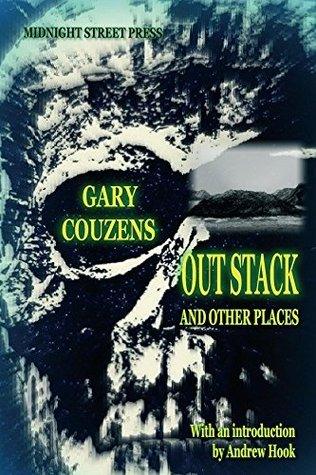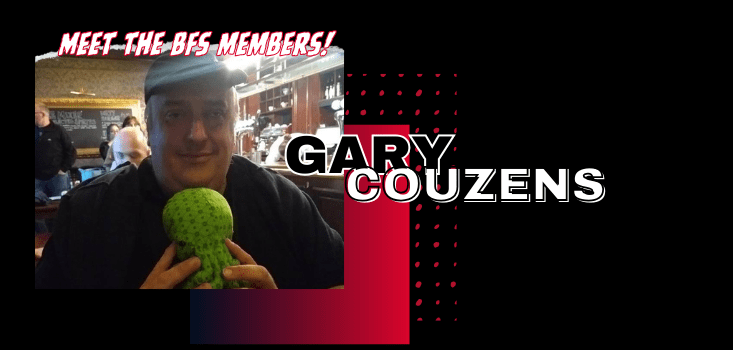Every Friday, we meet a member of the BFS and peer deep into their soul (or, at least, a form they filled out). Want to be featured? Email us: online@britishfantasysociety.org

Name:Â
Gary Couzens (he/they)
Which region are you based in?Â
I’m a lifelong Hampshire resident, and even went to university in that county (Southampton). I was born in Berkshire (Wokingham), but that was because it was the nearest maternity hospital to where my parents were living then.
If you write, which genre:Â
Sci-fi / Fantasy / Horror – all of the above, and a fair amount of non-SFFH fiction as well. Being a veteran of the 1990s small press, I will use the word “slipstreamâ€. My two collections both contain a mix of genres. Also a lot of non-fiction: film and disc and some book reviews, and articles.
If you don’t write, what do you do?
Listening to music, though I can’t play an instrument (did try to teach myself to play bass guitar for a while) and can’t sing. Addressing a huge book, film and TV to-watch pile. In the latter case, a lot of vintage/archive TV that I wasn’t old enough to see at the time or from before I was born. As I do review films and sometimes TV, all this adds to the knowledge base. One specialist interest is Australian cinema, as I’ve been an Aussiephile for over forty years. The main sport I follow is tennis, though since the Lionesses won Euro 2022 I’ve watched several of their matches, also the Olympics when it’s on.
Are you drawn to any specific SFFH sub-genres?
I would try anything in theory, but I can’t really do the harder varieties of SF. Not really traditional/other-world fantasy either, though I do have such a novel which will stay in the trunk. I notice that quite a few of my stories involve time, including time travel, and that includes my story “The End of All Our Exploringâ€, which was reprinted in Best British Science Fiction 2021. Some alternate history as well, and I have a big alt-hist idea sitting in the mental file marked “needs ridiculous amounts of researchâ€. My entry in the SF Encyclopedia says “edgily equipoisal with a bent to the supernaturalâ€.
Your influences
Tell us about the book/film/thing that got you into SFFH: What was it? How old were you? What impact did it have on you?
Multipart answer.Â
Like many in the UK of my age, my basic grounding in SFFH concepts came from Doctor Who, which I started watching in 1971 with “The Claws of Axos†(pictured; source), aged six. I also watched the original series of Star Trek from around the same time. I wasn’t allowed to watch horror films until I was old enough to stay up, so I don’t have a history of watching Hammer at the age of nine or ten, without or without parents, as several people I know have. They came later.
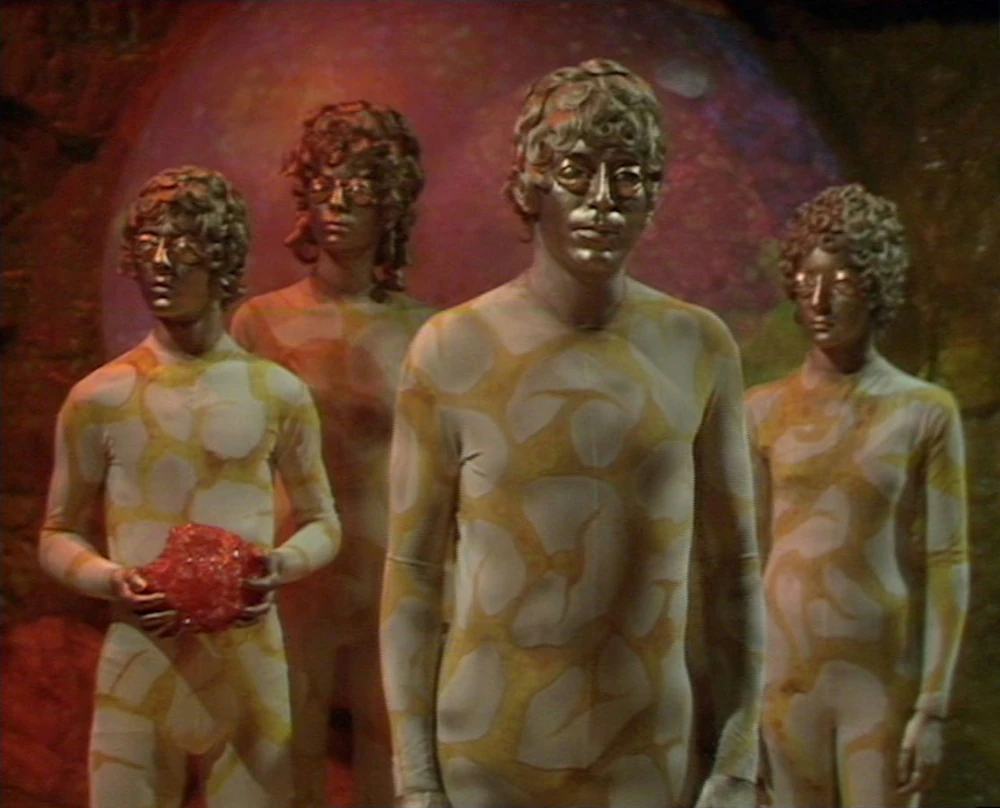
I do have strong memories of the BBC’s SF film season in 1974 (I was ten), the first genre film season on British television, which included my first viewings of Forbidden Planet and The Time Machine (1960 version). I watched those two in particular every time they were on in the 1970s and into the 1980s.
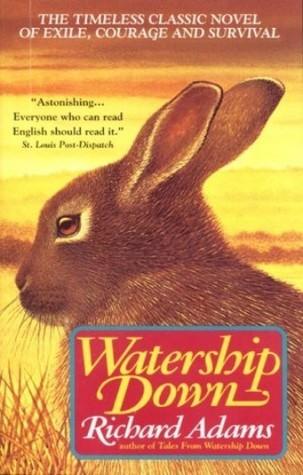
As for reading, my big year was my third year of junior school (Year 5 it would now be called). I read SFFH books from the school library, but in that year, 1974/5 during which I turned ten, I read for the first time Lord of the Rings, Watership Down and Gulliver’s Travels amongst others. That was actually the full unexpurgated version which somehow was in a junior school library. I suspect much of it went over my head then. I hadn’t quite finished it on the last day of the year when it had to go back, so I read the last few bits of it while walking along the pavement to school that morning.
That year I also read my first Alan Garner. My teacher insisted I read Elidor. Not The Weirdstone of Brisingamen or The Moon of Gomrath, which I was aware of – that novel. So I did. If by any chance you’re reading this, Mr Thomas then of Heatherside Junior School in Fleet, thank you.
Flash forward two years, and when I started reading in the adult library, I took an Isaac Asimov collection (The Early Asimov) out of the library and took it with me on holiday. From that point just about all the fiction I read which wasn’t a school book was SF for the next four or five years. I did lose interest and didn’t return to SFFH until the end of the 1980s and read far more widely. Horror novels began for me with Carrie in the early 80s after I saw the film on TV, and my return to SFFH was via that genre, particularly Clive Barker’s Books of Blood and Ellen Datlow and Terri Windling’s earliest Year’s Best Fantasy & Horror anthologies.
How does that early influence show up for you (in life/writing/agenting/publishing/editing/reading) now?
That period of almost-exclusive SF reading was probably the only time I could be called a genre reader. Since then I don’t read exclusively in any genre, and will happily read “mainstream†and literary fiction as well as SFFH if I think I’ll get something out of it. Plenty of classics I’ve never got to either.
Truth be told, I’m very far behind on SFFH and mostly read it at short length nowadays. I’m also undereducated in classic horror/weird fiction (pre-WW2, Victorian) but they did still let me into the BFS, even to Chair it for three years! So many books, so little time…
Some of those early writers I don’t read any more. Asimov (pictured; source), for example: a big ideas man, with some definining SF concepts due to him, but nowadays I’d notice more the flat style, functional-at-best characterisation (especially with his female characters) and I’d rather keep my memories. He was a very good non-fiction writer and populariser of science.
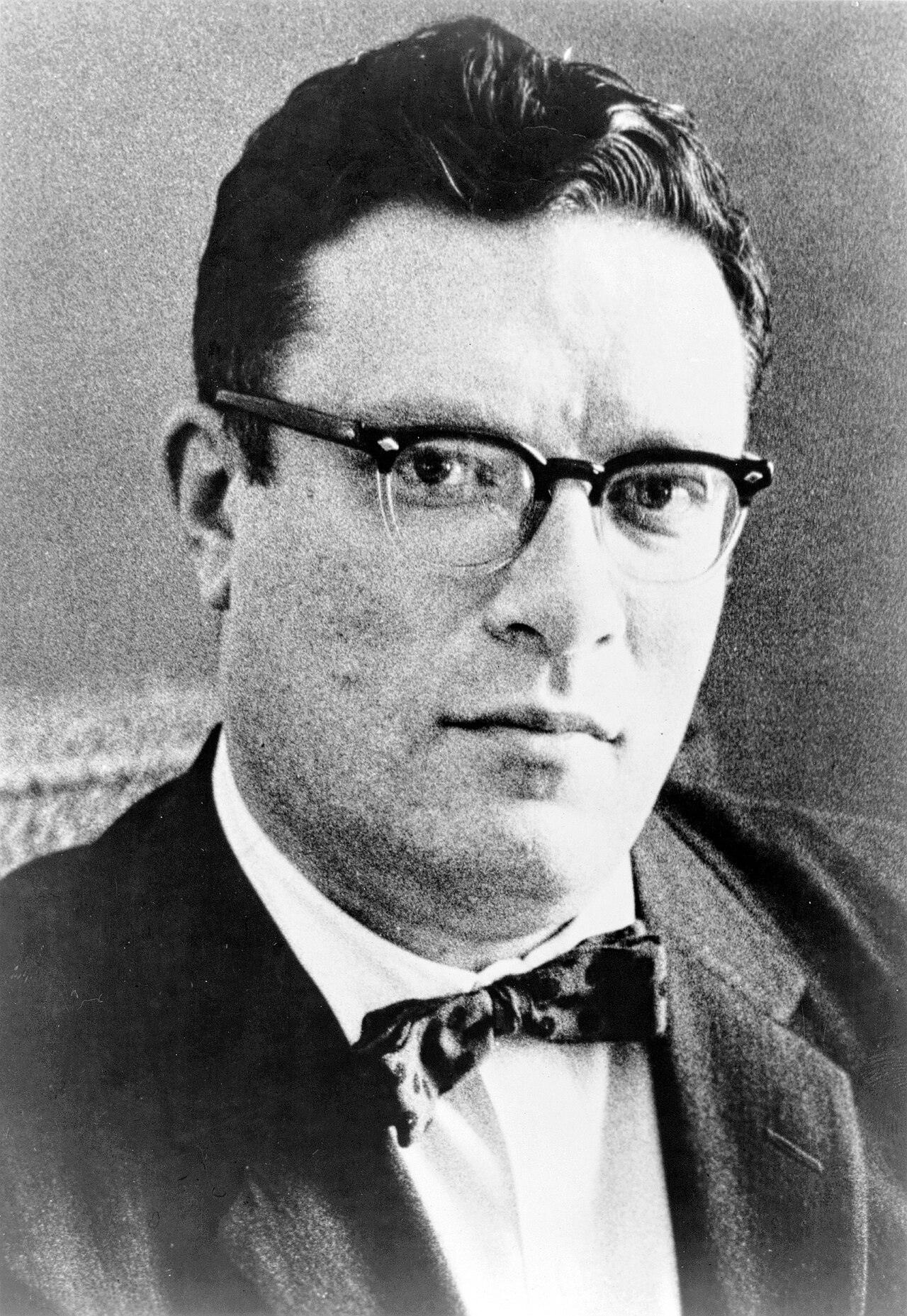

Alan Garner (pictured; source) I have read every novel by now, some of them more than once. Red Shift is the one I’ve read the most and that’s one of the densest and most challenging books I’ve ever read that was ever originally published as a children’s book. (It would be called YA now.) Garner is a minimalist in writing style, showing rather than telling to a greater extent than almost anyone else would do. Some of my favourite writers are minimalists, though the one I’ve read more by than any other (see below) certainly isn’t one. Garner is still active at ninety as I write this, and his non-fiction collection Powsels and Thrums is in my to-read pile.
As for films, well you know the score. I watch a lot and spend a great deal of time reviewing them, in various genres and from all over the world and in other languages as well as in English. It never ends. So many films, so little time…
Where do you draw your creative inspiration from?
This can vary. There have been times I’ve simply woken up with the story in my head and it then gets written pretty quickly. Others have started with an image in my head which I then have to work out where it goes to from there. I do believe that to have a creative spark enough to produce a story you need not one idea but at least two and to join them together. For example, “The End of All Our Exploring†began with an interest in lost television programmes, many wiped or junked, some going out live and never recorded in the first place. Doctor Who is the best-known show where many episodes no longer exist in their original form except in the memories of those who saw them. That struck me as a good metaphor for time and memory and the like, with the SF element of the story then added. However, the actual plot was inspired by An Education, the 2009 film I’ve seen several times, based on the memoir by Lynn Barber, which I also read. So the story is a fusion of all of those, plus an interest in Sixties London, where most of it is set.
Who do you look to as a genre hero? Why?
I’ve mentioned Alan Garner above, and I was BFS Chair when we gave him the Karl Edward Wagner Award. However, I’m going with Joyce Carol Oates (pictured), who is mainly published as a literary/mainstream writer but has had plenty of work published in genre publications. The Horror Writers of America gave her a Lifetime Achievement Stoker Award in 1993 and she’s still active more than thirty years later, well into her eighties. She is the author I have read more by than any other, alive or dead: in forty-two years since I was eighteen, over fifty of her over seventy-five novels and standalone novellas, plus several of her short-fiction collections as well.
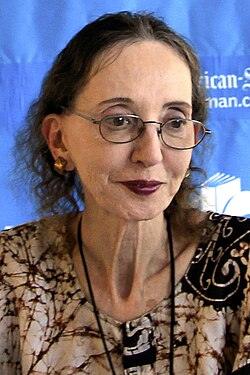
What I admire is not just the prodigious output but its range and general high quality. She’s not the most light-hearted writer to say the least, except sometimes in a very black way, but she’ll easily get under your skin. I have met her three times at book events, most recently at the Ghost Story Festival in Dublin in 2018, when she was guest of honour. Particular recommendations from a horror perspective would be Son of the Morning, Zombie, The Accursed, and the collection Haunted.
Your Work
You’re stuck in an elevator for 60 seconds with that hero, and they want you to describe your work. Give us the pitch.
I would say that I write SF, fantasy and horror of various types and non-SFFH fiction as well, at novel and short length. Themes of time and identity often feature. Like most people, I write what I’d like to read.
What are you working on right now?
A few years ago, I wrote what I thought was a short story. It started with an idea I thought was so obvious I didn’t know why anyone hadn’t used it before, but I didn’t then know of any examples. A typical M.R. James story (those I’ve read, at least) have protagonists who are middle-aged, scholarly, quite possibly asexual… and male. So, I thought, what if there was a James-style ghost story whose protagonist was all of those things, except a woman? So Maud was born.
I wrote that story but it soon generated a sequel and now it’s a novel in six episodes, with Maud’s encounters with the supernatural or otherwise set one a decade from the 1910s to the 1960s. Amongst other things, Maud takes part in the Suffragists’ Great Pilgrimage of 1913, is a volunteer nurse in World War I and an ARP warden in World War II. The working title for the whole thing is currently Maud. That original short story, which is chronologically the third episode, is “The Devonish Loom†which was published in the anthology Swan Song (Midnight Street Press, 2024). With luck and a fair wind, I hope to have the novel finished at least in draft by the end of this year. I seem to do more and more historical/period settings as I get older, though that obviously does take research. History was never my subject at school!
Add to that three other novels which exist in various drafts, one adult, two young-adult. And of course reviews and the series of BFS blog posts I started on genre children’s serials. The first one was on The Changes, first broadcast fifty years ago this year.Â
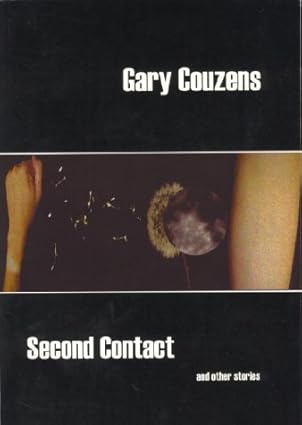
Thinking about all the stories/work you’ve done, what sticks out most in your mind? Why?
There are some stories which I’ve written where I’ve thought that if I haven’t screwed this up, I could do well with this. “The End of All Our Exploring†was one. “Second Contactâ€, the title story of my first collection (pictured), was another. That became my fourth ever story sale and seventh publication, first in the SFFH genre for both, appearing in The Magazine of Fantasy and Science Fiction in 1994.
Where and when do you create/are you at your most creative?
In life and in writing, I’m a morning person, and I’d rather do writing then, though have worked in the afternoon or evening sometimes if needed be. I’ll read and watch things at other times, and if I’m reviewing something that does count as part of the work.
What’s the best advice you’ve received about creativity?
Everything can be input, and if you want to be a writer of prose fiction you do need to be a reader too. Read above your level, the writers where you think “How on earth could I compete with that?â€, as that way you’ll improve and grow yourself. I’m not going to say that you have to write X number of words a day to call yourself a writer. A regular output is good, even if if isn’t every day, but sometimes life can get in the way. And do look after yourself, in particular if you can keep from burning out. I’m sure I’ve come close to that at times.
What’s your writing soundtrack?
The radio! I usually have it on while writing, most often BBC Radio 6. When I was at home in my then-day job during lockdown and afterwards, I started listening to the breakfast show while sitting at my work laptop with two monitors. I do have plenty of CDs around but generally listen to them when I’m not writing.
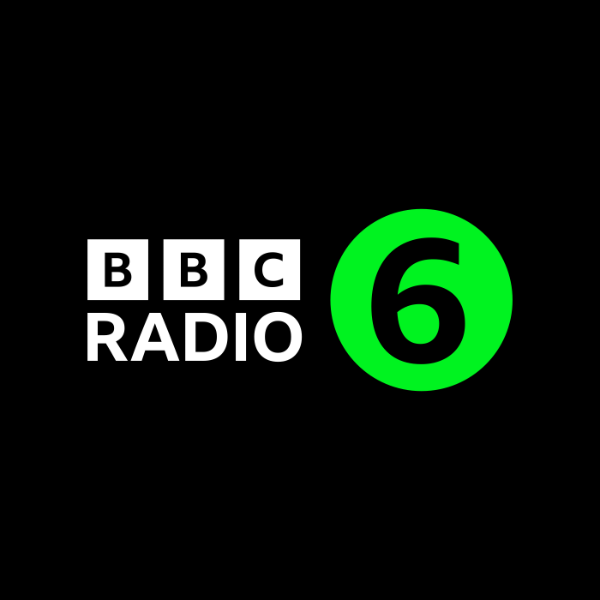
The Quick-fire Round
Sci-fi, fantasy or horror?
All and none of the above.
Quiet or loud?
Probably more quiet than loud, though I have my loud moments.
Dark or light?
Darker generally, which is no doubt a personal sensibility thing. I always say that horror, or dark material generally, isn’t depressing if done right, but cathartic.
Strict lines or genre blend?
Genres are there to be blended, or bent, or however you’d like to put it. Don’t build ghetto walls.
Awards or bestseller?
Probably more towards awards, though I have nothing against bestsellers and would happily read one if I thought I could get something out of it.
Fiction or non-fiction?
Both.
Poetry or prose?
I wish I could write poetry, but I have just three poems to my name, none published nor likely to be.Â
Plotter or pantser?
Modified pantser. Usually I have a beginning, an end and some key points in between, but the middle is open to development as I go along. I don’t have a whole story in my head when I start, unless it’s something quite short.
Reading or listening?
Definitely reading. I’m not good at being read to.
Notebook or computer?
I actually started writing on a typewriter, one which belonged to my grandmother (who was a writer, non-fiction articles). I taught myself to type at the age of ten. While I have written things longhand, occasionally as an experiment, it’s nowadays on a desktop or laptop.
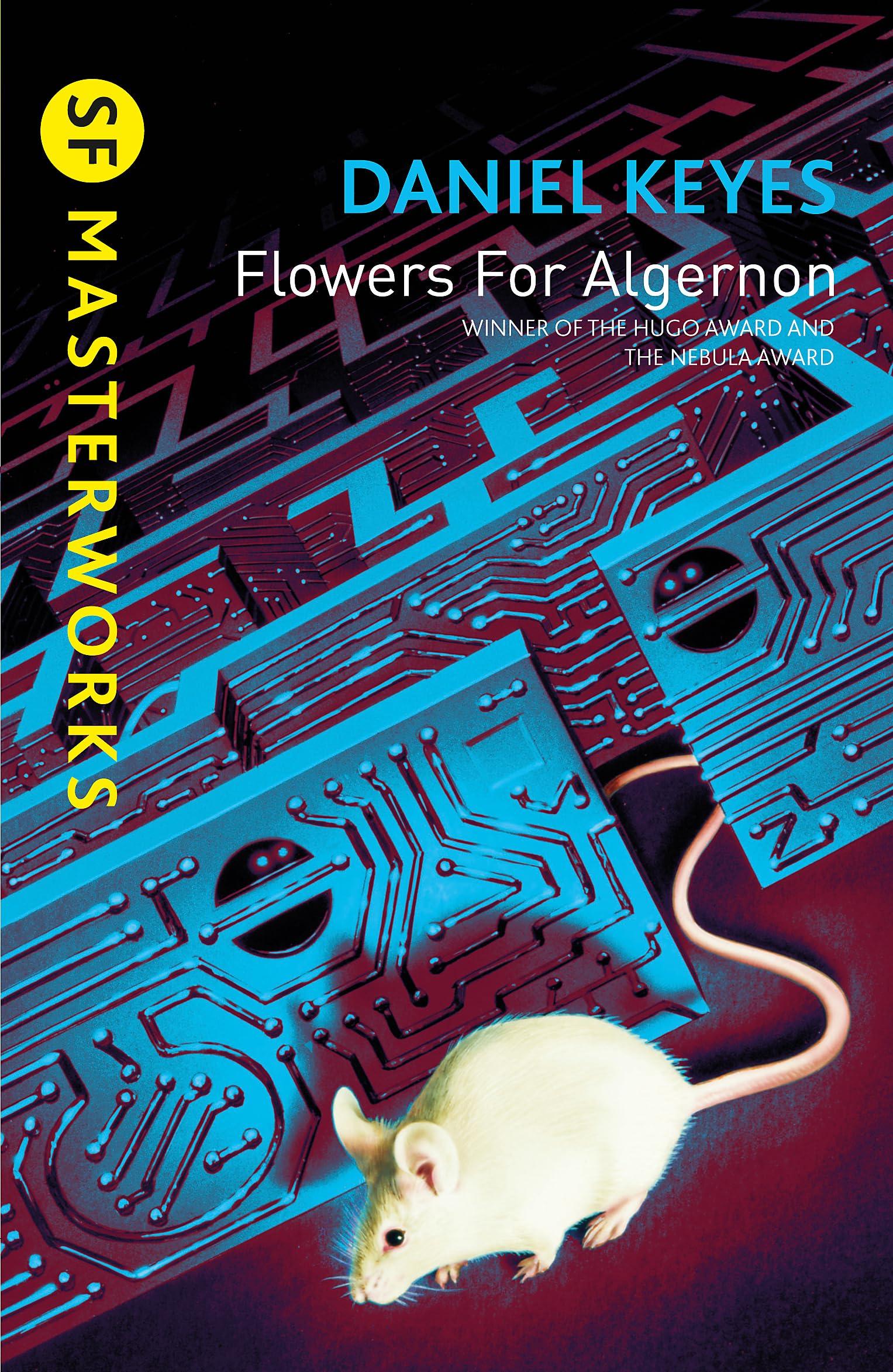
Favourite SFFH book of all time?
I find that the works that have the most effect on me, whether SFFH or not, have an emotional impact on me. Hence Daniel Keyes’s Flowers for Algernon. I worry about anyone who doesn’t have something in their eye by the end. It’s also a SF story that doesn’t require knowledge of SF tropes so it crossed over to a wider audience and has been adapted for film, television, radio and stage. Keyes wrote other things, but his fame rests on this one novel and the story it was expanded from, and as such his fame is secure.
Last book you read?
In SFFH, Marianne Dreams by Catherine Storr, which was the basis of the 1972 TV serial Escape into Night, about which I have a BFS blog post in the works. Otherwise, I’ve started my annual read of the Carnegie Medal shortlist, of which some will be SFFH.
Any SFFH author on auto-buy?
Mentioned above, Alan Garner and Joyce Carol Oates. Others include Nina Allan, Laura Mauro, Priya Sharma. The late Christopher Priest was one as well.
Favourite podcast?
In genre, The Coode Street Podcast, Fantasy Book Swap. Mentions to some no longer active such as Galactic Suburbia and The Writer and the Critic. Others I probably ought to listen to more than I’ve been able to. I subscribe to Mark Kermode and Simon Mayo’s film podcast (which frequently reviews SFFH films) and The Tennis Podcast.
The Home Stretch
What’s the best thing about being part of the SFFH community?
I’ve made a lot of friends in it, from a wide range of backgrounds and ages – from my parents’ age to at least one person who is of an age to be my grandson, if I had one. Exposure in writers’ groups to other people’s work, tastes, sensibilities can only be a positive. There are people I have regularly beta-read (and they me) who have become good friends as a result.
Time to plug your stuff! Where can we find you and your work? What have you got coming up? Consider this your advertising space.
My first collection (Second Contact and Other Stories, Elastic Press, 2003) is out of print, but the second (Out Stack and Other Places, Midnight Street Press, 2015, pictured) is available in print and e-book. I had short stories out last year in the anthologies Laughs in Space (ed. Donna Scott, The Slab Press), Time and Propinquity (ed. Mike Sauve and David Mathew, Montag Press) and, as mentioned above, Swan Song (ed. Trevor Denyer, Midnight Street Press). On the non-fiction side, I had a piece on the origins of Australian horror films in The Dark Side issue 263 and, also on the Aussie theme, I have an essay on Walkabout forthcoming in There’s Nothing Out There (ed. Sophie Essex, Black Shuck Books). Plus regular reviews at Cine Outsider.
